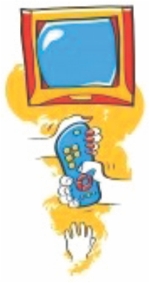| Home - Back Issues - The Team - Contact Us |
 |
| Volume 10 |Issue 27 | July 15, 2011 | |
|
|
Postscript Hail to the Picture Tube Aasha Mehreen Amin
Until the remote control warfare begins. Some households avoid the total breakdown of relations over 'who gets to watch TV now' and have just decided to install a set in every room so that even the six-year-old can watch his Disney channel in peace while grandma gleefully surfs from Al Jazeera to BBC to BTV. Most families, however, cannot afford the luxury of multiple TV sets to cater to multiple desires. To avoid the inevitable battles families have been compelled to take various strategies. If the hierarchy of power is clearly defined then it is quite simple. If there is a patriarch, he will get first privilege -which may mean hours of sports, news and the feeding patterns of Commodore Dragons (unless he is a Hindi serial and cartoon buff, in which case it is mostly a win-win situation for everyone). If there is a matriarch then everyone will be required to watch the talk shows, news and soaps in Hindi, English, Bangla and sometimes Spanish. An anthropological survey, however, may show that in many cases it is the youngest member of the family who has full jurisdiction of the remote control. Pre-schoolers, for example, seem to wield the most power, subjecting their parents not only to endless hours of Cartoon Network but advertisements which go on longer than the programme. Infants love bright colours, repetition and constant change of scene -all that advertisements provide. A silver lining to this otherwise dark cloud is that commercial breaks are the best time to get your infants distracted enough so that you can feed them anything, even mashed bitter gourd. School-going children, thankfully, have enough homework, tests, extra tutoring and emotional outbursts to occupy most of their time and so they have little time for television, giving others the chance to watch freely and unashamedly. Except during summer holidays. This is when children own the house along with most gadgets and that valued appliance that gives so much happiness to people. There is little that parents can do except go with the flow in order to avoid the horrible B word ('I'm bored'). Many parents are in fact going through an identity crisis because of watching too many shows with their offspring. Some are so hooked that they secretly watch reruns while the child is out hanging out with friends. Parents may be caught off guard at social gatherings – they may not even know that the country is on the brink of anarchy or the hartal has been extended another 36 hours because they were too busy watching the Tales of Narnia or the latest dance mania hosted by Hrithik Roshan. The days of meaningful family conversations at the dinner table may be a thing of the past for many urban households. Now it is that loud, squarish object that has become the babysitter, the filler of awkward silences, the provider of entertainment – unsavoury or not and the harbinger of all that you need to and don't need to, know. With enough hours devoted to it, this wondrous creation of modern civilisation can even replace the brain. As long as the picture tube is working. Copyright
(R) thedailystar.net 2011 |
 T
T